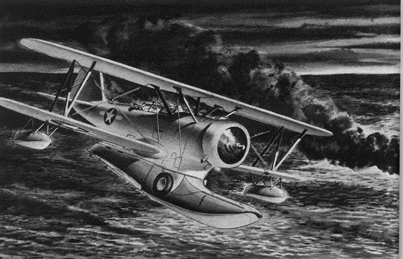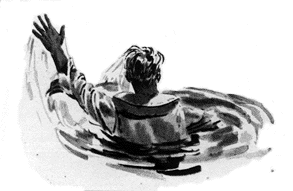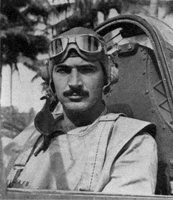

The Zeros were like sky wraiths, elusive shadows that appeared fleetingly in the sights and then vanished before pressure on the switch could send forth the fifty-caliber slugs.
Wildcats could not fight the wraiths on these terms. Something had to be done, a way found. The colonel called the major and the captain into conference. The colonel and the major advanced the theory; the captain tested it in the battlefield above the Solomons and found it good. The captain became many times an ace, the major went on to other fields, the colonel’s name became legend.
The squadron’s toll of enemy planes mounted. Other squadrons copied the technique that was called by the colonel’s name. And American planes ruled the skies by day over the Solomons. This is the story of that colonel... Lieutenant Colonel Harold Bauer.
THE Japs were overhead all night, dropping their loads at regular periods, just often enough so that sleep around Henderson Field was only something to wish for, wistfully, while crouching in a foxhole.
With the coming of dawn the enemy withdrew somewhere to the north. Marine fighter pilots crawled stiffly from dugouts and blinked wearily at the sun’s first rays. Cooks hurriedly made weak coffee from already used grounds while the pilots splashed semi-cool water on bearded faces, stopping only to watch a patrol bomber settle to a landing on the steel mat of the air base’s flight strip.
Three men detached themselves from the group of fighter pilots and hurried to the tent labeled "Operations." Normally, the three men would have borne no resemblance to each other. Now they were alike, a trio cast in the same mould of toughened leanness; pink-rimmed, tired eyes, sun-blackened, bearded faces. Only their ranks were different: colonel, major, captain.
The bomber crew had already reported their reconnaissance when the three fighter pilots arrived at Operations. The report was urgent. The enemy was converging on Guadalcanal from the north. It was the big push, the test of whether or not we could hold what our Marine jungle fighters had taken.
Messengers left Operations on the double. Terse orders were given. Places were marked on maps. There was little conversation. The three men of the fighter squadron and their fellows who flew the dive bombers and torpedo bombers had small need for words. The job was there to be done, not talked about.
The meeting broke up in the staccato bark of engines warming up – the sharp coughing of Wildcats, the assured drone of Dauntlesses, the deeper mutter of Avengers. Outside the tent was hurried, orderly activity. Trucks loaded with gasoline drums rolled here and there. Planes swarmed with crewmen making final cheeks. The pilots stood nearby in small groups, puffing cigarettes, not saying much.
The major walked over to a waiting jeep with only a flip of the hand to signal, "See you, fella. Give ’em one for me." He was gone in a spattering of mud. The colonel and the captain shook hands briefly. The captain hurried to his pilots, the colonel moved slowly to his own tent.
Sound rolled across the high hills and battered at the eardrums, the sound of many engines revving up. A line of Douglas dive bombers moved into the take-off position and was gone into the rising sun. The Grumman torpedo bombers followed, boring into the upper air with grim purpose.
The captain settled more firmly into the seat of his Wildcat, heard the control tower’s "go ahead," and waved. The squadron moved in line behind him, a parade of squat, deadly shapes. The colonel watched them take off, no expression on his quiet, good face. Only in his reddened eyes was there a trace of wistfulness. Rank imposes obligations. A colonel’s job was one to tie a man to the muddy earth, to keep him out of the bright blue that was his element. He went into the tent.
Silence came with sharp impact. There was a hush as the last Wildcat vanished into the north, then the usual noises of machines and men intruded and the brief silence was gone.
The noise rose: drones of many engines, pounding of heavy shapes on the noisy steel runway, and now and again the crruuump of falling bombs and the reverberations of anti-aircraft when the Jap Zeros were overhead.
The fighter squadron returned, but the count of those landing was less than the count of those who had taken off. The colonel barked orders. Almost before the Wildcats stopped rolling, the crewmen were swarming over them with gasoline hoses, with belts of ammunition.
The captain, lighting a cigarette, strode toward the colonel’s tent. His report was cold, unemotional, giving no hint of hell on air, of dive bombers smashing into the enemy fleet, of torpedo bombers droning low into enemy guns to drop their fish, of his own Wildcats flailing the air with fire, of riding a mad merry-go-round in a sky filled with Zeros.
Only the facts were there, but the picture was vivid in the colonel’s mind.
In bare minutes the squadron was gone again, to keep another rendezvous with the enemy high over the invasion fleet. The colonel once more began to pace the confines of his tent.
Again the squadron came back. No losses this time, but exhausted pilots slumped in their seats and slept while the crewmen did their work.
The colonel watched them out of sight again, and he was quietly cursing.
Reports trickled in from the radio hut. Enemy transports were being left a shambles. The water to the north was strewn with frantically swimming Japs. Columns of smoke rose thousands of feet from burning ships. And still the enemy came on....
The squadron returned. Some planes were wheeled aside, too shot up to take the air again. Hospital corpsmen ran here and there, now patching up a slight crease, again lifting from the tight seat some pilot who fought and struggled and swore monotonously because his job had ended with a crippling wound.
And always there was the tall figure of the captain moving among his planes, asking a question here, giving a word of advice or encouragement there. It was only in the brief periods with the colonel that he relaxed and let his face become haggard, worried, human.
Jeeps roared up with food for the pilots. A fighting man’s diet – canned salt meat, soggy vegetables, weak coffee. The pilots stripped and splashed fevered bodies with dirty, tepid water, then found a bit of shade long enough to smoke a cigarette.
The colonel said, "I’m going with you."
The captain looked up from his tin of meat. "Like hell you are. We’re doing all right... plenty all right."
The squadron took off, and the colonel watched them go. They were his boys. "Coach," they called him. "I’m okay now, Coach. The arm is all healed. How’s about sending me in there... how’s about it?"
They were all in there now, every man who could sit up in a cockpit. They were in there pitching while fatigue brought aches to muscles, hung weights on eyes.
And he was on the ground.
The squadron came in for the fourth time, battered, worn out, but still ready for battle. The colonel watched a corpsman carry away a pilot who protested feebly that his wound was not serious. He watched the captain come toward him across the strip. He went into his tent to where his flight gear was hanging.
The captain found him ready for flight. Helmet, phones, parachute, life jacket.
There was no argument.
"I’m going with you. I’ll fly wing."
When the squadron took off again and formed into sections, the colonel was riding the captain’s right wing.
The squadron rendezvoused with Douglas Dauntlesses high over Savo. They went in search of the enemy.
The Jap ships made a pattern of white streaks below. Practiced eyes picked them out: transports, destroyers, cruisers.
The captain kept his fighters high while the dive bombers went in. He couldn’t watch, as he scanned the heavens for enemy fighters. When he did find time to look, the dive bombers were reforming far below, heading home. Mission accomplished; fighter cover no longer needed.
He spoke shortly into the interphone. The squadron wheeled in the direction of Henderson Field. All but the captain, the colonel and a lieutenant riding left wing. The three planes went down as though tied in a V, heading toward the enemy ships.
Fifty-caliber slugs carved a swath through crowded transport decks. The trio pulled out and headed straight for home.
Then the Zeros came... from nowhere!
The captain felt the bite of slugs into the Wildcat’s fuselage and cracked the throttle, pulling out sharply to line up his sights on a pursuing lap. Now and then he caught a brief glimpse of another Wildcat flashing by, chasing and being chased by the slim silhouette of a Zero.
It didn’t last long. One moment the air was full of the enemy, next they were disappearing across the water. The captain took a deep breath and looked around. Only one Grumman was with him. The colonel was missing.
He remembered a Wildcat diving past with a Zero on its tail, and the brief memory sent his own plane over on a wing in a screaming turn. Back to the area where the Japs jumped them.
The captain’s eyes strained for a telltale bit of flotsam on the waves below. Twice he circled the area. The second time he found an oil slick, perfectly round, as though someone had painted it on the waves. And in the middle of the slick was the colonel.

The captain pulled the Wildcat around and dove so low he could see a big grin on the colonel’s face, see him leap far out of the water and wave.
The captain made a sharp turn and went back, jerking his boat release just over the colonel’s head... but nothing happened.
He slapped furiously at the release mechanism, trying to free the jammed life raft. It was hopelessly stuck.
The lieutenant was nearby. The captain picked up his microphone and pressed the button to call him. The radio was silent, smashed by an enemy slug.
The captain slapped his throttle wide and went after his wingman. He caught him, motioned that his radio was out, signalled for the lieutenant to follow.
Back over the oil slick they went, the captain waving frantically for the wingman to release his rubber raft. The waves were high, the colonel’s head only a mote in the vastness of the water. The wingman shrugged helplessly. He couldn’t get the captain’s meaning.
The captain poured the coal to his plane and swung sharply for Henderson Field. The shadow of the Wildcat raced ahead because the day was almost at an end.
He didn’t wait for an okay from the control tower. The wildcat was slapped down in front of Operations. Surprised officers saw a madman leap from the cockpit before the Grumman stopped rolling. He ran toward them.
"The colonel’s down! I need somebody to fly the ‘Duck!’ " He pointed to an unshapely amphibian that stood nearby. The Operations officers could only stand there. None of them could fly the unwieldy craft.
The captain didn’t waste any time. He commandeered a jeep from a startled Marine and sped toward wing headquarters, heedless of taxiing planes, of other jeeps or trucks. The general’s orderly had time to open his mouth, but not to say anything before the fighter pilot was standing in front of the commanding officer.
"Sir, the colonel is in the water off New Georgia."
The general surveyed the tall, dirty, bearded figure, and there was pity in -his eyes. "I’m sorry, captain. I can’t order a man to take that old crate up north. The Zeros.... It would be suicide."
A well-knit figure stepped into the general’s hut and stood beside the captain. It was his friend the major. He said, "I’d like to go, sir."
The general paused. He knew these men of his and their quality. Perhaps he was thinking of the major and the colonel and their young wives forming a bridge foursome, of the colonel and the captain tilting glasses together in some civilized place.
He said, "Okay, son."
The captain and the major were gone on the echo. From outside came the scream of protesting jeep tires. The general lifted his phone, issued quiet instructions. "Have the ‘Duck’ fueled and warmed up when they get there."
The major hadn’t even stopped for flight gear. He ran for the "Duck" clad only in shorts and a T-shirt, with the captain close behind. In seconds the "Duck" was rolling out of the revetment to the landing strip, wheeling into position, poising for the take-off.
And in that moment a flight of medium bombers landed. The major yelled into his microphone for take-off clearance. There was no answer, because the "Duck’s" radio was somewhere in the repair tent.
The captain looked straight down the runway into the whirling props of the medium bombers. They had all landed and were taxiing down the landing mat, not bothering with the taxi strip a few yards to the right. The captain began to swear.
The major looked at the bombers coming at him, and made a lightning decision. Down toward the lethal props waddled the "Duck," gaining speed with every yard.
The control man shot red rockets into the air, fired his pistol, screamed futilely at the mad "Duck." The captain’s language rose to a startling crescendo.
Bare yards in front of the bombers the "Duck" clawed its way into the air. The bomber pilots turned pale and threw them selves to the decks of their cockpits.
The captain continued to swear, but with-reverent awe.
Low over the water the "Duck" flew, toward the colonel, aided by the prayers of the captain and the major. The water was pink below with the last rays of sunlight, and the waves were subdued with the calm that comes at dusk.
The captain plotted the position and the "Duck’s" flight slowed. It began to wheel in methodical circles, two pairs of eyes straining for a dot among the waves. It grew darker rapidly until the pilots could see only along the sunpath toward the west. Then that, too, was gone.
The "Duck" banked clumsily around, back toward home. Slowly, now. No urgency. There was no sound inside the plane except the engines’ roar and the ghostly hum of flying wires. Each man was busy with his thoughts, his memories.
It wasn’t until Henderson Field was in sight that the major snapped from his reverie. How to get in? His radio was missing. The spatters would have picked them up by now. The field defenses would spot the "Duck" for an enemy plane!
He dropped to tree-top height and threw the propeller into low pitch. Nothing else made such a sound. Surely someone would recognize the "Duck!" He lined up the field, then swayed frantically as orange flame blossomed under a wing. Anti-air-craft! He skidded the "Duck" this way and that, watching meanwhile for the first sight of the landing strip. Again orange flame blasted, and this time he gave a sigh of relief. Not anti-aircraft, but heavy artillery shooting at the enemy down the island. The "Duck" flopped to the runway with a groan of gratitude. Two silent men got out and walked side by side to where anxious pilots were waiting.
There were no bombs that night, because the enemy was busy elsewhere, fighting for his life against the power of American naval guns a few miles out to sea. Sentries on hilltops could see the flash of the big guns, the balls of tracer shells, an occasional explosion that might mark the end of one of the enemy ships – or ours.
The captain and the major sat in the darkness of a tent and smoked and talked, and their talk was bitter.
The major had gone out with the "Duck" time and again to pick up a fallen pilot. Why did it have to be this, of all times, that his mission failed?
The captain thought he must have failed in some respect. The boat release wouldn’t work, the radio was out. But surely he could have made the wingman understand!

Finally they slept: one of America’s great utility pilots, Major Joe Renner; one of America’s all-time aces, Captain Joe Foss. But their sleep was fitful, because "the coach," Lieutenant Colonel Harold Bauer, was out there somewhere, waiting.
The day greeted an odd sight. A low skirmish line of trim Grumman Wildcats and one lone, lumbering Grumman "Duck" skimming the water off the Solomons. Of course the "Duck" could not keep up. It flew its lazy course while the little fighters wheeled in great circles around it.
Far to the north the caravan flew until below were the sleek lines of American fighting ships, then the smoking hulks of defeated enemy vessels. They circled the ocean battlefield, their minds filling with the knowledge that the enemy threat was broken, Guadalcanal was secure. Then they turned north again to continue the hunt.
Past the battered enemy fleet they flew, past coral atolls until they came to the scene of yesterday’s brief battle. They formed a skirmish line again for the search. At the head of the column Captain Joe Foss sat in the tight seat of his Wildcat, his eyes searching endlessly. And in the middle of the stub-winged line lumbered the "Duck." Major Joe Renner sat in the front seat, his heart growing heavy as hope vanished.
Mile after ocean mile they scanned, giving careful scrutiny to each wave and whitecap.... The colonel was gone. Below them was only the restless sea.
Click HERE if navigation menu is not visible on the left